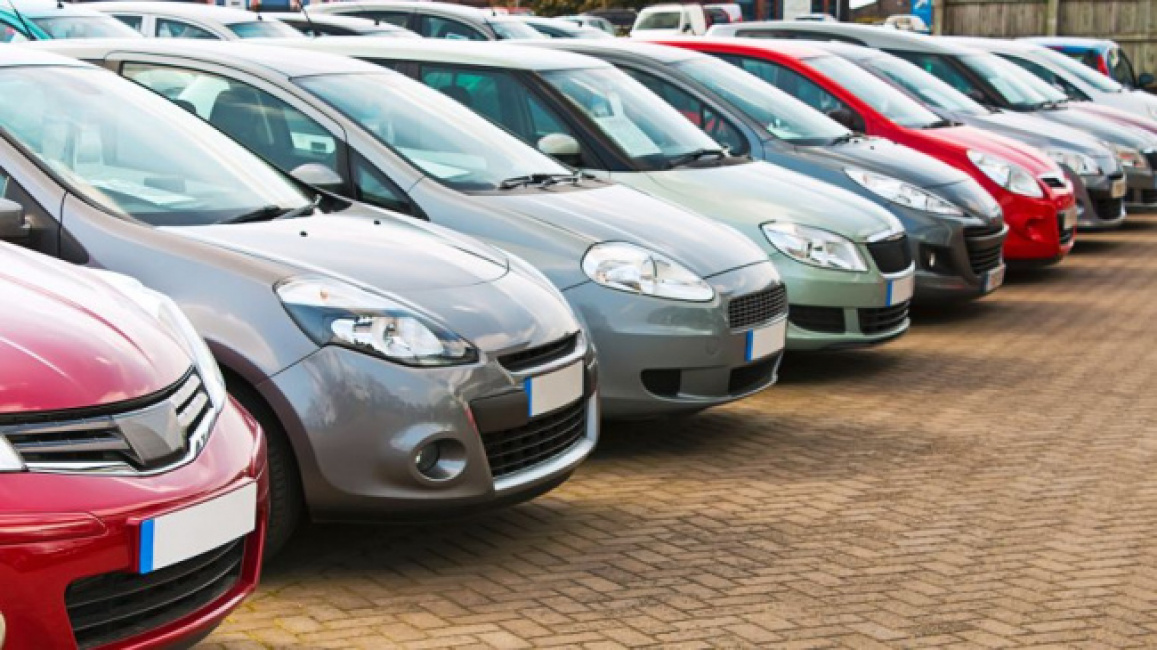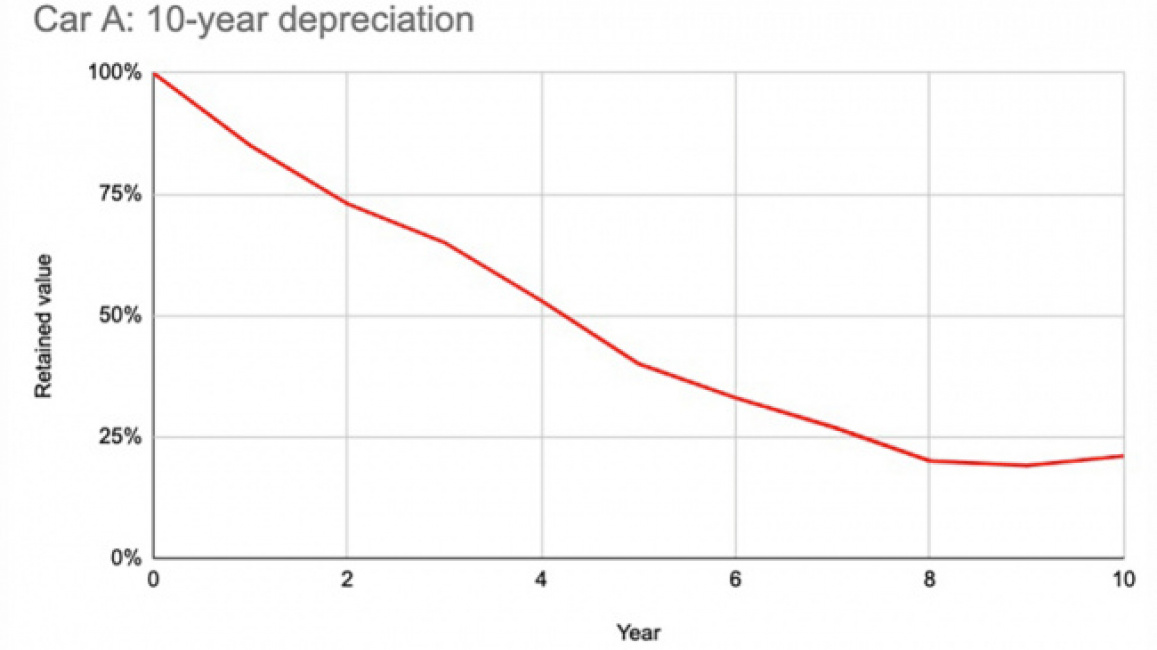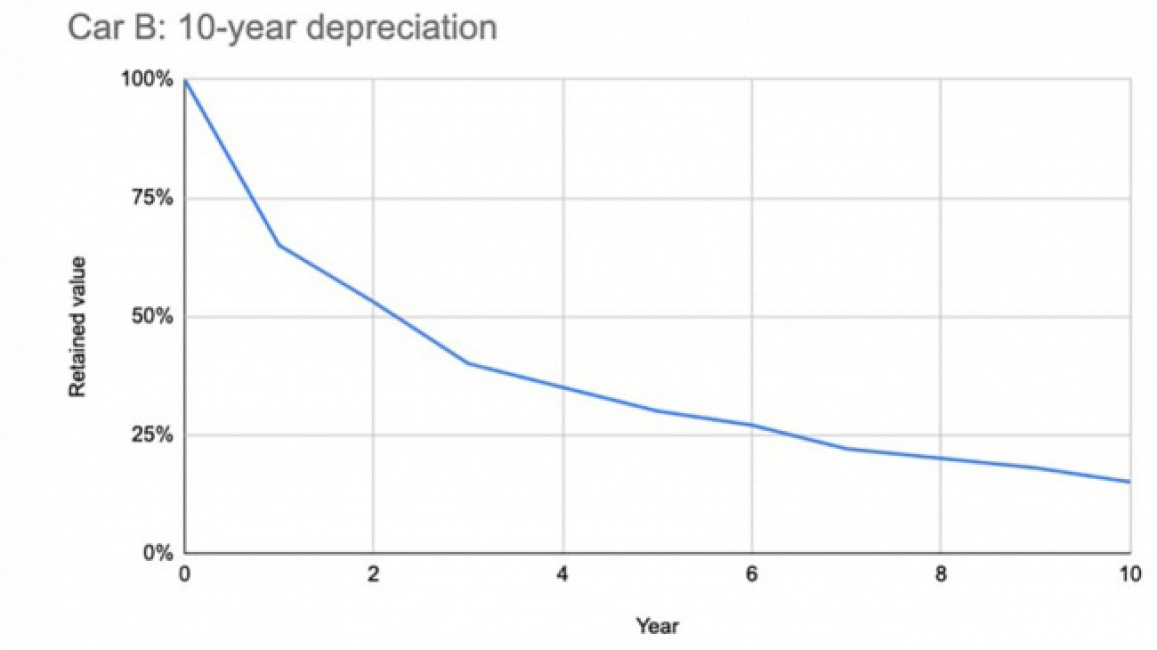What is car depreciation, how does it work and what can you do to minimise it on your car? We reveal all in our guide…
- Car depreciation explained
- Fastest depreciating cars
- Slowest depreciating cars

You’ve probably heard it said that the biggest cost attached to running a car is depreciation. It’s a well-worn cliche that in the vast majority of cases, a new car will be worth dramatically less than what you’ve just paid for it as soon as you drive it away from the showroom – but it’s also true.
Depreciation is a reality of car ownership, particularly with newer models. The car is an asset and its market value will usually fall over the first few years as it slides down its depreciation curve. How fast it depreciates and the overall shape of that curve depends on a whole range of different factors and understanding how these work can limit the effects of depreciation, both as a car buyer and a car owner.
We explore the ups and downs of car depreciation below with top tips on how to minimise your losses, and you can find our round-ups of today’s fastest and slowest depreciating cars on the adjoining pages…
What is car depreciation?
Put simply, depreciation is the difference between what you paid for a car and its current market value. The residual value of a car is how much of the original purchase price could currently be recouped by selling the car.
Typically, a car is at its most valuable when it rolls off the production line as a brand new, unused product ready to be sold. After its first sale it instantly becomes a used car, which reduces its value. As the car is driven, it covers more miles, it accumulates wear and tear, faults might occur and its value gradually falls further.
The initial phase of a car’s use tends to be the steepest part of the deprecation curve, particularly that first 12 months. After three to five years the car will have accumulated on average around 8,000 to 12,000 miles per year and its manufacturer’s warranty will have expired. After eight to 10 years most cars have suffered the majority of their depreciation. The curve tends to flatten out beyond that and some rare or desirable models may even start to go back up in value as the number of examples left on the road declines and market demand holds strong.
What does a car’s depreciation curve look like?
The particular profile of a car’s depreciation curve, and at what point on it you buy the car, can have a major impact on what that car costs you to run. As a general rule, you might expect a car in the UK to lose around 15% of its value on average every year over a 20-year life cycle. Different cars, however, will lose that value at very different rates.
Depreciation chart example: Car A

This is an example of a 10-year depreciation curve for ‘Car A’, a desirable, well cared for model that holds on to its value much better than most. After three years it is still worth 65 per cent of what it was worth when new. The decline in value is then relatively linear down to the eight year mark where retained value is 20 per cent of the new price. There’s then a slight uptick in value, possibly as demand starts to outstrip the number of models on the market. The car may even be thought of as a future classic!
If you bought this car new and sold after three years in average condition for a car of that age, you would only lose 35 per cent of what you paid for it in depreciation. If you bought it at four years old, you would pay around half what it cost new and you could sell after another four years having lost only around 25 per cent of what you paid for it in depreciation. Buy after nine years and you could even make a profit.
Depreciation chart example: Car B

Car B has a more severe depreciation curve than Car A, losing 35 per cent of its value in the first year. After the sharp initial decline in value, however, the depreciation curve flattens out. This means that while the first owner takes a big depreciation hit, a second owner, buying after three years could get the car for 40 per cent of what it cost new and run it for four years losing only 18 per cent of what they paid in depreciation.
What impacts a car’s rate of depreciation?
Some new cars drop in value like a stone and will be worth less than 30 per cent of what you paid for them after three years. Others will tenaciously hold on to their value and might still be worth 70 per cent of that new price three years later. What ultimately determines a car’s trajectory in all cases is what car buyers want.
It all boils down to supply and demand. If supply of a particular car model outstrips demand, then used prices go down, and if there’s more demand than supply, prices go up. It’s why you see some rare sports cars with limited production runs being sold for well above the manufacturer’s list price in the months and years after they launch, as buyers scramble to access the finite supply of an asset that they predict will increase in value.
Such cases are very much the exception, though. Almost all cars depreciate to an extent, it’s just that ones with high market demand hold on to more of their value than those with low market demand. Market demand, of course, is determined by a whole range of different factors.

The market
From the current state of the wider economy, to global supply chains and promotional activity by manufacturers, there are all kinds of things beyond the particulars of the vehicle itself that will impact a car’s value and depreciation. Following the COVID pandemic and the resulting shutdowns of car and component factories around the world, a reduction in the supply of new cars caused long waiting lists and propped up car values, because buyers who needed a car quickly were forced on to the used market.
Recessions and tough economic times can suppress customer demand for cars, forcing prices down and potentially prompting manufacturers to offer discounts on new cars that can also put more downward pressure on used prices.
Make and model
It’ll be no surprise that the kind of car you choose has a big say in what kind of depreciation it will suffer. It’s well known that cars from certain manufacturers hold on to their value better than others. So-called premium brands tend to enjoy stronger residuals, which are driven by the desirability of their cars on the used market. However, the car market is an increasingly complex place and depreciation rates can vary wildly depending on which model you choose in a given manufacturer’s range.
The trick is understanding what the used car market wants, and what it will want in the future. SUVs have been one of the major success stories in the car world over the past decade, and demand for used models tends to be higher than for conventional hatchbacks and estates. Small car values tend to hold up well because they’re usually tightly priced when new, and there’s always a ready supply of people wanting affordable, economical used runabouts.
Sports and performance cars can be a mixed bag. Certain limited edition specials with full waiting lists can immediately be worth more than the manufacturer’s list price as speculators look to get their hands on future classics. Even more run-of-the-mill sports cars can hold on to their value tenaciously if they’re the best of the breed at a particular time and supply is short.
On the other hand, expensive but unfashionable fast cars with big, thirsty engines that aren’t well received by reviewers can lose money quickly. The worst culprits tend to be large luxury cars with high list prices and running costs to match their dimensions. High-end luxury saloons often top the lists of the fastest depreciating cars on sale, because demand for used models is limited.
Powertrain
The car market is undergoing its biggest period of upheaval in a century with the advent of electrification, and the mode of propulsion you choose for your next car could have a big say in how fast it depreciates. Generally speaking, diesel, the fuel of choice in the early 2000s, is falling out of favour with new car buyers, while electric cars are experiencing strong demand.
There are always exceptions to the rule, however, and there’s a risk with electric cars and plug-in hybrids that the rapid improvement in technology can affect values of older models with less advanced systems offering shorter driving ranges.
The manual gearbox is also firmly on the decline in new cars, not least because EVs don’t have gearboxes. It’s long been the case that buyers of many premium and luxury models wanted an automatic transmission and that was reflected in used values. But in some performance models, manual versions are highly prized on the used market and sell at a big premium over autos. In the future, used manual cars will become much rarer. It’s likely that this split will be compounded, with automatics becoming the expected norm across a wider section of the market, while rare manual performance models will become even more prized.
Specification
Once you’ve settled on your new car and its engine, you’ll want to choose its specification. But before you descend into an options list box-ticking frenzy, it’s important to think about residual values. A sensibly specced car can hold on to its value much more effectively than a fluorescent yellow one with red leather inside and the £2,000 dog pack, for example.
It comes down to what the market expects. Some cars – think coupes, performance models and convertibles – can carry-off bright colours, but speccing a mainstream hatchback in a lurid shade could make it harder to sell, depressing its value.
It’s the same with trim levels, entry-level specs tend to be quite basic and are less sought-after by used buyers than those with a few more luxuries, or sporty trims that improve the looks of the car. At the other end of the scale, top trim levels and expensive options can inflate the price of the car to a level that will see it depreciate faster on the used market. It’s a case of looking for a happy medium that elevates a car above the norm to add desirability while stopping short of ordering the UK’s most expensive Ford Fiesta, for example.
Think about which features really add value to the car. Depending on the model, upgraded infotainment systems, larger alloy wheels, panoramic sunroofs and, heated seats are more likely to be appreciated by a used buyer. Paying extra for advanced driver assistance gadgets, lurid interior trim upgrades and accessories is cash you’re less likely to get back. Remember that if you pay £20,000 for a car and lose 30 per cent in depreciation you’ve lost £6,000. If you paid £40,000, that same 30 per cent decline is a £12,000 hit.
Reliability
Reliability is absolutely crucial in the thinking of used car buyers, but solid information about which cars are the easiest to get along with is difficult to come by. Our Driver Power car customer satisfaction survey is the biggest of its type in the UK and an invaluable source of information on car reliability. Choose a brand and model with a reputation for reliability and you’ll find that depreciation tends to be slower, because of the demand from other buyers out there looking for a car that they can depend on
Mileage
The more you drive a car, the less valuable it gets, but then using it is really the point of having a car in the first place. Mileage is used as a general gauge of a car’s condition, so models that have a lower than average mileage for their age will be worth more, and the reverse is true.
The average annual mileage for a car in the UK is 8,000 to 12,000 miles, but certain types of cars will rack-up higher mileages than others. For example, city cars and sports cars tend to accumulate fewer miles than executive saloons that are regularly ploughing up and down motorways.
General condition and history
Probably more important than mileage when it comes to how much you actually get for your car is its condition, and this is an area where you can make a big difference. Look after your car well and you can fend off the ravages of depreciation to a significant extent.
This extends from getting it serviced by a reputable dealer in line with the manufacturer’s service schedule and keeping records of any work done, to looking after the paintwork and keeping the interior free of knocks and scuffs. A buyer is going to inspect your car at some point, and each imperfection will be viewed either as a cost to them to put right or a negotiating point they can use to lower the price.
Tax, charges and legislation
Emissions-based taxation and road charging schemes have become more of an issue for motorists in recent years and that’s likely to increase in the future – with a corresponding impact on the value of some cars.
UK road tax regimes tend not to apply retrospectively, so VED is payable based on the tax system that was in force when the car was new. It means that high-emissions cars registered between 2001 and 2017 are more expensive to tax than newer cars, and this has an effect on depreciation.
The London congestion charge and Ultra Low Emissions Zone (ULEZ) have also had a big effect on car values on a local level, and with more areas across the country planning similar schemes, we’ll see more of the same elsewhere. Electric cars can enter the congestion charge zone for free, while non-Euro 6 diesel cars and non-Euro 4 petrol cars must pay the ULEZ charge to enter that extended zone. It all has the effect of boosting the residual values of more environmentally friendly models while suppressing those of cars that don’t fit the bill.
With the 2030 ban on the sale of new petrol and diesel cars looming, the market is in for a major shake-up. Will electric car residual prices benefit, or could it conceivably boost values for used petrol and diesel models that are no longer available new? Will the ban be watered down or moved? Things will doubtless become clearer as the date approaches, but big effects on car values will almost certainly be felt.
How do you calculate depreciation on your car?
Car depreciation is a simple calculation. The difference between what you paid for the car and what it’s worth now is the amount by which it has depreciated, with the current value often referred to as the residual value. A car’s original list price is set in stone, so the trick is understanding its current market value.
It’s possible to get a good idea of what your car is worth today by checking online for similar models for sale. Better still, use our free car valuation tool for a precise appraisal of your vehicle.
You can even make a simple calculation as to what a car’s future depreciation prospects might be by assuming that it will lose 15 per cent of its value every year for the first 20 years. However, this is only a very rough estimate. For a truly accurate picture, you’re going to need some outside help.
There are lots of services out there that offer depreciation calculators and tables based on ongoing market analysis. The likes of CAP HPI and Glass’s have detailed future valuations for every car sold in recent years, and we use similar services to provide an idea of future residual values in our in-depth car reviews.
How to minimise your car’s depreciation: top tips
1. Choose the right car You can set yourself on the path to low depreciation by going for a desirable car from a premium brand with a good reputation for reliability. Small, economical cars are always in demand, but be wary of big, expensive models with high running costs, especially from unfashionable sectors of the market. 2. Spec it wisely
Don’t over or under spec your new car. The market will expect a certain level of equipment on a particular type of model and cars with the lowest depreciation will exceed those expectations without going overboard. Avoid outlandish paint or interior trim options that might limit the car’s appeal and think carefully before spending extra cash on expensive options or fully-loaded trim levels.
3. Buy when the time is right
Cars tend to lose most of their value in the first year and have done the biggest part of their depreciating after three years. New-car buyers can avoid crystallising their depreciation losses by holding on to their cars for that bit longer and used buyers have the option of targeting cars at the optimum point in their depreciation curves. Of course, this means buying and running an older car, which comes with its own problems.
4. Minimise mileage
More mileage means more depreciation so, if at all possible, try to keep the miles on the clock to a minimum.
5. Maintain it properly
Keep your car properly maintained and serviced as the manufacturer intended, keeping a record of any work done. Avoid racking up needless MoT advisories or failures that will be visible to future buyers by getting the car checked out prior to its tests.
6. Keep it clean
Keeping the car clean and avoiding minor damage to the bodywork or interior trim will do wonders for its future value. Look after your paintwork and wheels, and think about getting minor cosmetic damage fixed. Avoid smoking or letting pets loose in the car if possible.
7. Avoid modifications It’s possible that some modifications and aftermarket upgrades can add value to certain types of car, but in the majority of cases changing the vehicle from factory spec will increase deprecation. Many buyers will be more cautious with cars that have had lots of ‘enhancements’ added.
Continue Reading
- 1
Car depreciation explained – currently readingWhat is car depreciation, how does it work and what can you do to minimise it on your car? We reveal all in our guide…
- 2
Fastest depreciating carsAlmost every new car depreciates, but some shed value faster than others. These are the top 10 fastest depreciating cars on sale today
- 3
Slowest depreciating carsCar depreciation is a fact of life with car ownership. But these are the cars that lose the least over time
Keyword: Car depreciation explained: future residual values and how they’re calculated
